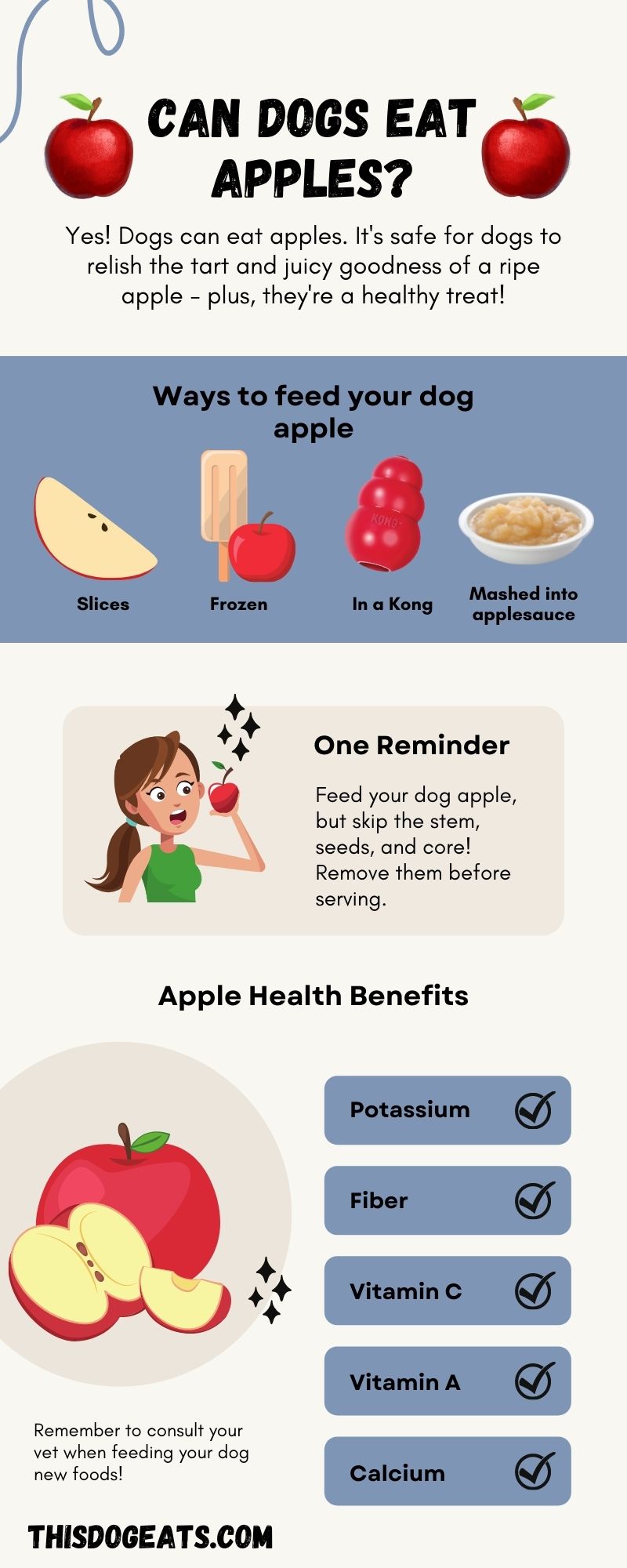Can dogs eat apples?
There’s nothing better than biting into a crisp, sweet apple when you’re in need of a snack. Plus, they’re a healthy treat! We all know that an apple a day keeps the doctor away, but do they keep the veterinarian away too?
Is it safe for dogs to relish the tart and juicy goodness of a ripe apple? Read on to find out if this nutritious snack is good for your canine companion too. After all, sharing is caring!
Can dogs eat apples?
Yes! Dogs can eat apples.
In fact, apples are a nutritious snack for both you and your dog.
But, there are benefits and risks when it comes to giving apples to dogs, and things you should know before you feed them to your pup.
See below to learn more about this tasty snack, and all about the safe ways to serve them.
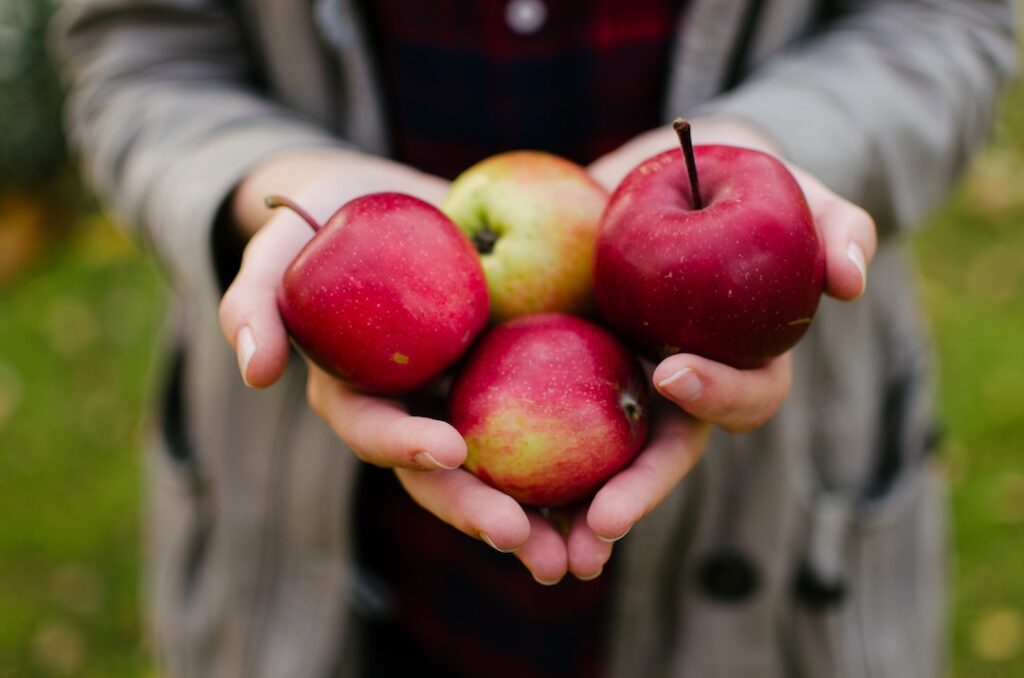
Are apples good for dogs?
Yes! Apples are good for dogs. They’re full of nutrients that are beneficial to your dog’s health, and an excellent source of the following:
- Vitamin C: This antioxidant boosts your dog’s immune system, supports healthy aging, and reduces inflammation.
- Carbohydrates: A great source of energy.
- Fiber: Promotes healthy bowel movements, colon health, and relieves your dog of constipation. It also aids in weight management.
- Vitamin A: Supports vision and skin health, and helps power the immune response.
- Potassium: Helps muscle development, supports healthy kidney and heart function, and aids in healthy bone density.
- Vitamin K: Essential for helping blood to clot and to prevent bleeding issues.
- Calcium: Supports bone and dental health, muscle development and function, and a healthy nervous system.
- Phosphorus: Important for healthy kidney function, muscle contraction and nerve function.
Beside being generally nutritious for both humans and dogs, apples are also an excellent choice for dogs in the following situations:
- They’re a great option for a low-calorie treat, perfect for dogs looking to maintain or lose weight.
- They’re affordable, and great for anyone on a budget.
- They’re easy to pack, and good for on-the-go snacking.
- They’re low in protein and high in fiber, which make them a good choice for dogs who have restrictive diets that don’t allow for high protein and/or fat. This is especially helpful for senior dogs or dogs with certain illnesses.
- They’re chewy, and help keep your dog’s teeth clean.
Can puppies eat apples?
Yes, apples are a great snack for puppies.
They’re high in Vitamin C, which helps puppies in particular with proper bone and muscle development.
Just be sure to supervise your puppy while they eat the apple. Cut the apple into small pieces, so it’s not a choking hazard, and watch carefully to make sure they don’t experience any digestive issues.
Also, be sure to speak to your vet before introducing any new foods to your puppy. The vet knows best!
How many apples should I feed my dog?
Crunching on apples is fun and refreshing, but your dog shouldn’t have too much.
Eating an excess of apples can lead to a stomachache, or even diarrhea and vomiting – don’t forget, apples are high in fiber!
Apples should be served as an added bonus to your dog’s already balanced diet. They’re a special treat, not a meal.
If we’re following the popular 90/10 rule, where 90% of your dog’s calories come from meals, and 10% come from treats, then your dog is entitled to a slice or two per day. This is pretty perfect, because an apple slice or two will likely be enough to satisfy your dog’s cravings – everything in moderation!
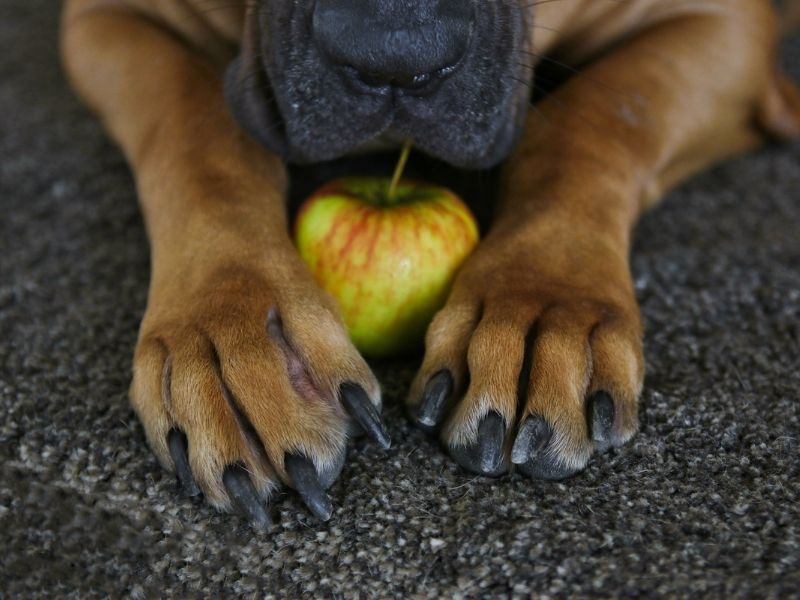
When are apples bad for dogs?
Apples are full of nutrients that can be beneficial to your dog’s health, but there are some dangers to look out for.
Apple seeds
Apple seeds contain trace amounts of cyanide, a chemical that is toxic to dogs.
If your dog swallows a few seeds, don’t panic, as a small amount isn’t likely to cause any harm. But eating large amounts of seeds or consuming a small amount regularly over time can lead to cyanide poisoning.
Who wants to take that risk? No one, that’s who. Remove all of the seeds from the apple before serving the tasty snack to your dog.
Apple cores and stem
Another thing to watch out for are apple cores. They’re firm, and can be difficult to chew and digest. They’re also a choking hazard, so be sure to remove them, along with the stems.
Sugar
Apples are naturally sweet, and on average each fruit contains about 19 grams of sugar. While they’re great for satisfying your dog’s sweet tooth, they may cause problems for dogs who suffer from cancer or diabetes. Too much sugar can cause diarrhea or upset stomach, so serve them in moderation.
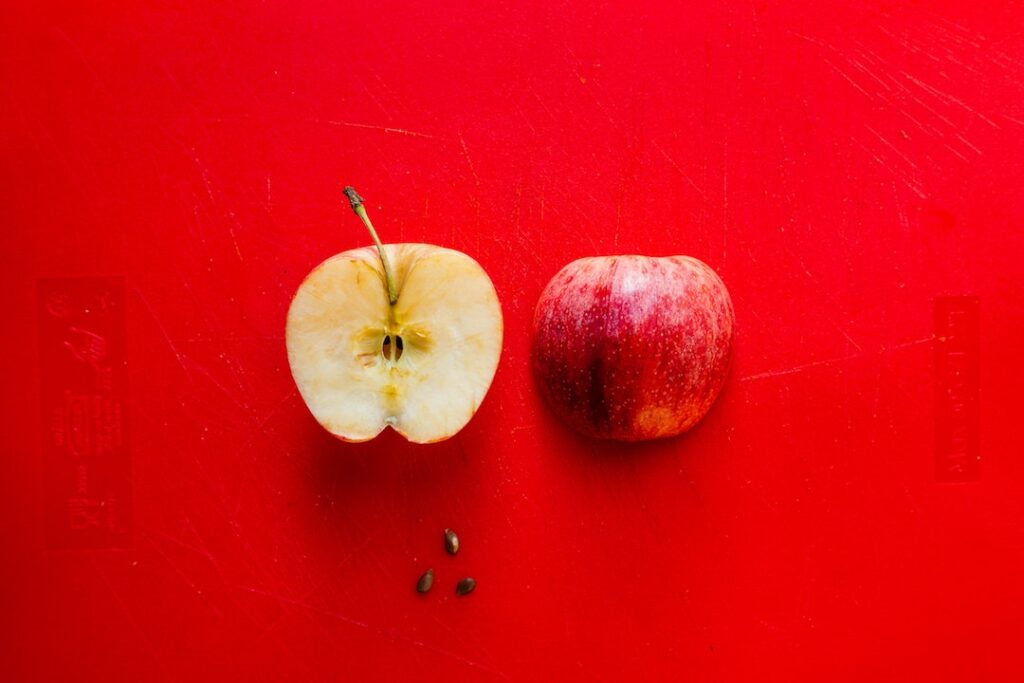
Herbicides and Pesticides
Supermarket apples can be coated with unnatural substances that make them shiny. They can also be coated in herbicides, pesticides, and other chemicals that aren’t good to ingest.
Be sure to wash your apples thoroughly before eating, and, when possible, stick to organic apples. They’re safer for both you and your dog.
Can dogs eat apple peels?
Yes, dogs can eat apple peels. There’s no need to skin the apple before serving.
Not only are they a delicious part of the apple, but they’re chock full of fiber, which helps your dog maintain a healthy weight, and aids in their digestion.
Just remember, feed your dog apple peels in moderation. Too much fiber can be tough for dogs with sensitive stomachs. If you notice digestive problems, then start peeling the apple before serving it, or cut back on apple treats entirely.
What kind of apples can dogs eat?
One of the best things about apples is the variety – there are tart apples, sweet apples, big apples, small apples, and more. From Fuji to McIntosh to Red Delicious, there’s a whole smorgasbord of this delicious fruit available.
Luckily, your dog can eat any apple! Just be sure to remove the seeds, core, and stem, and to cut them into small enough pieces.
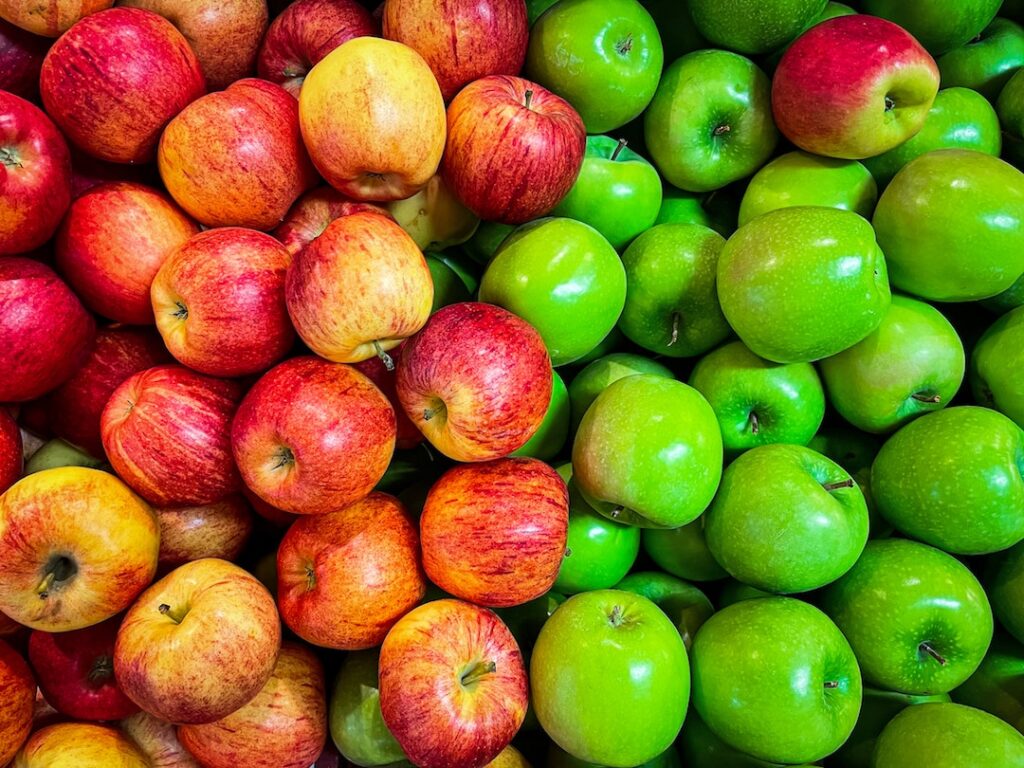
Can dogs eat green apples?
Yes! Green apples are totally ok for your dog to enjoy.
Can dogs eat granny smith apples?
Yes! Dogs can eat granny smith apples.
Can dogs eat red apples?
You’re probably sensing a pattern here – but yes, dogs can enjoy red apples, as well as any other variety of apple you can find at your local farmer’s market or supermarket. Go nuts!
Can dogs eat dried apples?
Yes, dogs can eat dried apples.
They make for a great, crunchy, low-calorie treat. Like apples themselves, apple chips should be given in moderation, as a treat.
Can small dogs eat apples?
Yes, small dogs can eat apples. Just be sure to cut the apple into small slices or cubes to prevent them from becoming a choking hazard. Remember to supervise your dog while they’re eating, and to always remove the apple seeds and core.
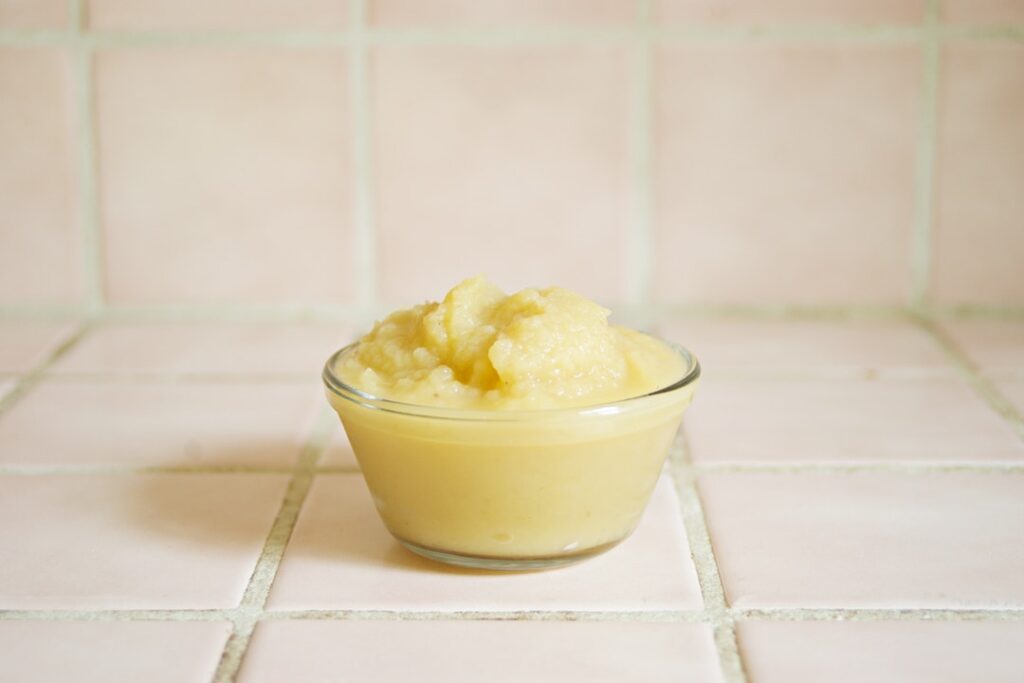
Can dogs eat applesauce?
It depends! Dogs can safely eat plain applesauce that contains few ingredients.
But applesauce, particularly store bought versions, generally contains added sugars and butter. They might even contain artificial sweeteners such as xylitol, or added chemicals that are no good. It’s a less nutritious form of eating apples, with little nutritional benefit.
If you’ve made a healthier, unsweetened applesauce at home, feel free to feed it to your dog in moderation. You can allow them to lick it, add it to a Kong, or freeze it in ice cube trays.
Can dogs eat apple chips?
Apple chips are a less nutritious form of apples, because they’re fried or baked and typically contain added sugar.
Even though these ingredients aren’t toxic for your dog, they’re not exactly healthy either. They can lead to weight gain, diabetes, or upset stomachs. Skip the empty calories and give your dog a healthier treat instead.

Can dogs eat apple pie?
I’d skip the apple pie.
Apple pie is a dessert that contains ingredients that aren’t healthy, like lots of sugar, butter, and nutmeg. Just like with the apple chips, these additions can lead to upset stomachs, weight gain, diabetes, or worse.
Nutmeg includes a toxin called myristicin. In small doses, it could cause mild gastrointestinal distress, and in large doses, it can cause hallucinations, high blood pressure, and seizures.
It’s best to leave the apple pie to the humans, and give your dog something else.
Can dogs eat apple seeds?
No, dogs should not eat apple seeds.
Apple seeds contain cyanide, a chemical that is toxic to dogs. While your dog will probably be ok if they accidentally eat a few seeds, eating large amounts of seeds or consuming a small amount regularly over time can cause cyanide poisoning.
Be on the lookout for these symptoms if you think your dog has been poisoned, and contact a veterinarian immediately:
- Dilated pupils
- Difficulty breathing
- Panting
- Shock
Can dogs eat apple cores?
No, dogs should not eat apple cores. They’re a choking hazard, particularly to small dogs and puppies, and hard to digest. Slice the apple, and skip the core and the stem too, while you’re at it.
Can dogs eat apples with peanut butter?
Apple slices with peanut butter bring me back to my childhood – they’re a great snack! And luckily your dog can indulge in this yummy treat too. Dogs can eat apples with peanut butter as long as the peanut butter does not contain xylitol, the artificial sweetener. A slice or two will make a delicious treat, but don’t forget to feed this snack in moderation.
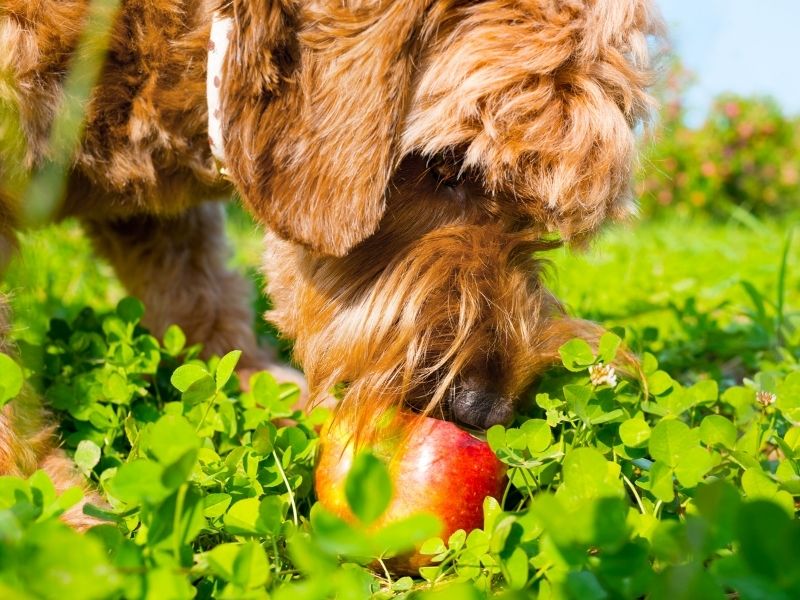
How to safely feed apples to dogs:
If you want to safely feed apples to your dog, follow these steps:
- Wash and scrub your apple to remove any bacteria or germs.
- Remove the core, stem, and seeds.
- Optional: remove the peel if your dog has digestive issues, or cannot consume lots of fiber.
- Cut the apple into slices or small cubes. Remember to size them appropriately, so your dog doesn’t have trouble chewing and to prevent choking.
- Supervise your dog as they consume the crisp, delicious treat!
If you’d like to mix it up, there are many other ways to dish up apples. Here are a few options:
- Cut the apple into small cubes and stuff them into a Kong. Give at room temperature or freeze it – great on a hot day or as a healthy snack.
- Freeze a whole apple and then slice it as a summertime treat.
- Mix it in with dog-safe ingredients, like peanut butter or yogurt.
- Mash it into a homemade applesauce, and serve plain or blend it with other healthy fruits.
Can dogs be allergic to apples?
Just like humans, dogs can have adverse reactions to certain foods. When experimenting with new foods for your dog, always be on the lookout for any kind of unwanted reaction, like itchiness, excessive licking, or swelling and hives. If you see any signs of an allergic reaction in your dog, stop serving the apple immediately and contact your veterinarian.
Now that you’ve got the skinny on dogs and apples, check out other fruits your dog can eat.
